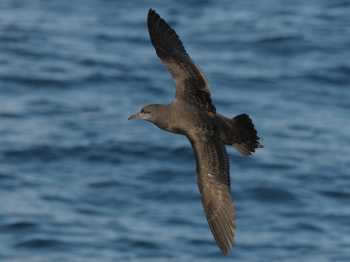Several shearwaters of the genera Calonectris and Puffinus have been identified by ACAP as potential candidates for listing within the Agreement, partially because they face similar threats as do ACAP-listed albatrosses and petrels - such as fisheries-induced mortality and attacks by alien predators at their breeding sites (click here). One shearwater so identified is the Near Threatened Sooty Shearwater P. griseus.
Felipe Moreno-Gómez and colleagues based at the Universidad Austral de Chile, in Valdivia, Chile writing in the bulletin Aliens of the IUCN/SSC Invasive Species Specialist Group show that Sooty Shearwaters that breed in large numbers on Chile's Isla Guafo are at risk to Black or Ship Rats Rattus rattus. They recommend further research, formal protection of the island and the eradication of the rats.
The paper's abstract follows:
"Seabirds nesting in island ecosystems are highly vulnerable to introduced predators. Sooty Shearwater (Puffinus griseus) form large breeding colonies in southern islands of Chile, South America. However, there are not studies determining the threat degree to this seabird associated to this kind of predators. This article reports the presence of introduced rats in the largest colony of Sooty Shearwater in the world (Isla Guafo, Chile), discussing the potential impact generated by rats over seabirds."

Reference:
Moreno-Gómez, F.N., Reyes-Arriagada, R. & Schlatter, R.P. 2010. Introduced rats on Guafo Island (Chile) and their potential impact on Sooty Shearwater Puffinus griseus. Aliens: The Invasive Species Bulletin. Newsletter of the IUCN/SSC Invasive Species Specialist Group 29: 34-39. http://www.issg.org/pdf/aliens_newsletters/A29.pdf.
For information on the management of Sooty Shearwaters on New Zealand's "mutton-bird" islands visit the Kia Mau te Tītī Mo Ake Tōnu Atu (Keep the Titi Forever) research project which produces the newsletter Tītī Times (latest issue No. 22 of August 2010) at http://www.otago.ac.nz/titi/.
Click here to read about efforts to conserve the Vulnerable Pink-footed Shearwater P. creatopus, endemic to Chile. See also http://www.oikonos.org/projects/fardela.htm. The Pink-footed Shearwater has also been identified as a potential ACAP species.
John Cooper, ACAP Information Officer, 8 November 2010

 Français
Français  English
English  Español
Español